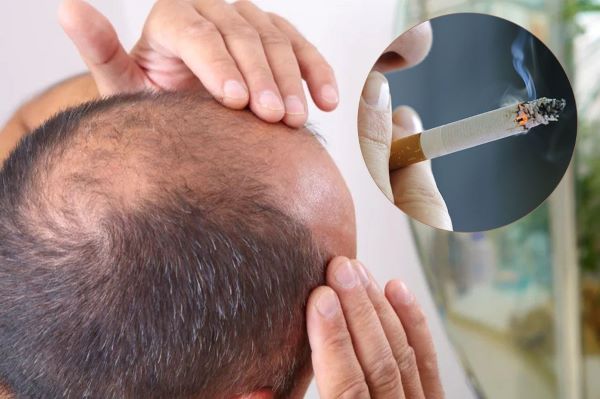Are you curious about what lies beneath the hair fall and smoking? Have you ever wondered why do Smokers Lose Hair? It’s a question that has left many puzzled and scratching their heads. But the truth is, smoking has a covert consequence that lurks in the shadows, beyond the widely recognized health hazards. It’s time to embark on an intriguing odyssey, delving deep into the labyrinthine connection between smoking and hair loss. Brace yourself to unravel the enigma of hair loss, exploring the uncharted territory of nicotine’s influence, the perils of toxins, and the mysteries concealed within hair follicles. Get ready to feel a mix of emotions as we journey through the science, physiology, and lifestyle choices that tie together these seemingly unrelated facets.
Table of Contents
Why do Smokers Lose Hair?
You may wonder why hair loss is a widespread issue among smokers. How Does Smoking Cause Hair Loss? When we look into the complex connection between smoking and hair loss, we find some factors that contribute to this perplexing issue. Several studies have found some significant cause association between smoking and hair loss, particularly male pattern baldness. In this section, we explore the first set of mechanisms through which smoking can lead to hair loss.
- Negative impact on blood supply: Smoking is thought to have a negative impact on the blood supply to hair follicles. The reduced blood flow can affect the health and function of the hair follicles, leading to hair loss1.
- Damage to DNA: Cigarette smoke contains genotoxicants that can cause damage to the DNA of hair follicles. This damage can disrupt the normal growth cycle of hair and contribute to hair loss.
- Imbalance in protease/antiprotease systems: Smoking can lead to an imbalance in the protease/antiprotease systems that control tissue remodeling during the hair growth cycle. This imbalance can interfere with the normal functioning of hair follicles and contribute to hair loss.
- Pro-inflammatory effects: Smoking can have pro-oxidant effects, leading to the release of pro-inflammatory cytokines. This can result in follicular micro-inflammation and fibrosis, which can contribute to hair loss.
- Hormonal effects: Smoking can increase the hydroxylation of estradiol and inhibit the enzyme aromatase, leading to a relative hypo-estrogenic state. Hormonal imbalances can affect hair growth and contribute to hair loss.
It’s important to know that smoking is not the sole cause of hair loss, and other factors such as hormonal changes, medical conditions, medications, nutritional deficiencies, and stress can also play a role. Quitting smoking and adopting a healthy lifestyle both can help improve overall hair health and reduce the risk of hair loss.
See also: Can B12 Deficiency Cause Hair Loss?
Smoking and Hair Loss: the Symptoms
Identifying the Initial Signs of Smoking Affects Hair
The initial signs of smoking-induced hair loss are similar to other types of hair loss and may include:
- Thinning of hair on the crown or temples
- Receding hairline
- Increased hair shedding or hair loss during brushing or washing
It’s important to note that these symptoms can also be caused by other factors such as hormonal changes, medical conditions, medications, nutritional deficiencies, and stress1. Therefore, it’s essential to consult a healthcare professional to determine the underlying cause of hair loss.
Gender Differences in Smoking-Related Hair Loss
Studies have found a significant association between smoking and hair loss, particularly male pattern baldness. However, smoking can also contribute to hair loss in women. Women may experience diffuse hair loss or thinning of hair on the crown of the head. Both men and women face unique challenges when it comes to smoking-related hair loss. Men are more likely to experience male pattern baldness, which can be a distressing condition that affects self-esteem and confidence. Women, on the other hand, may feel embarrassed or self-conscious about their hair loss, which can affect their social and professional lives.
Scientific Case Studies on Smoking and Hair Loss
Several scientific studies have investigated the relationship between smoking and hair loss. These studies have found a significant association between smoking and hair loss, particularly male pattern baldness. The underlying mechanisms by which smoking causes hair loss are not yet fully understood, but it is thought that smoking has a negative impact on the blood supply to hair follicles, causes damage to the DNA of the hair follicle, and leads to an imbalance in the follicular protease/antiprotease systems controlling tissue remodeling during the hair growth cycle. The studies on smoking and hair loss are credible and have been published in reputable scientific journals. However, more research is needed to fully understand the relationship between smoking and hair loss and to develop effective prevention and treatment strategies.
The Connection Between Smoking and Hair Loss
How does smoking cause hair loss? Effects of Smoking on Hair Loss
- Smoking is a preventable cause of significant systemic disease that can also affect hair health.
- Smoking has a negative impact on the blood supply to hair follicles, which can contribute to hair loss.
- Studies have found a significant association between smoking and hair loss, particularly male pattern baldness.
- Smoking can cause damage to the DNA of the hair follicle, leading to hair loss.
- Smoking can lead to an imbalance in the follicular protease/antiprotease systems controlling tissue remodeling during the hair growth cycle, which can interfere with the normal functioning of hair follicles and contribute to hair loss.
- Smoking can have pro-oxidant effects, leading to the release of pro-inflammatory cytokines. This can result in follicular micro-inflammation and fibrosis, which can contribute to hair loss.
Some other causes connected to Hair Loss
Exploring the Role of Nutritional Supplements
- Nutritional deficiencies have been clinically detected in hair loss patients and are known to alter the immune response.
- Vitamin and mineral deficiencies can lead to hair loss and are known to affect the immune response.
- Nutrient deficiencies cannot always be detected clinically as the deficiencies are masked and compensated by self-regulating processes of redistributing the utilization of nutrients in the body.
Personal Habits and Hair Loss
- Poor sleeping habits, carnivorous eating, and junk food consumption have been associated with the severity of androgenetic alopecia (AGA).
- Heavy physical labor and stress have also been associated with the severity of AGA.
- Smoking has been studied and proven to contribute to AGA.
- The severity of MPHL (male pattern hair loss) is more prevalent in smokers than non-smokers.
Common Misconceptions about Smoking and Hair Loss
There are several common misconceptions about smoking and hair loss that need to be addressed. Here are a few of them:
- Myth: Only men are affected by smoking-induced hair loss. While male pattern baldness is more common in men, smoking can also contribute to hair loss in women.
- Myth: Smoking only causes hair loss in older people. Hair loss can occur at any age, and smoking can contribute to hair loss in both younger and older individuals.
- Myth: Smoking marijuana does not cause hair loss. While there is limited research on the effects of marijuana on hair health, some studies suggest that marijuana use may contribute to hair loss. However, more research is needed to fully understand the relationship between marijuana use and hair loss.
Weed Smoking and Hair Loss
As mentioned earlier, there is limited research on the effects of marijuana on hair health. However, some studies suggest that marijuana use may contribute to hair loss. One study found that heavy marijuana use was associated with a higher risk of hair loss in men. However, the underlying mechanisms by which marijuana use may contribute to hair loss are not yet fully understood. It’s important to note that there is a difference between tobacco and weed smoking in relation to hair loss. While smoking tobacco has been linked to hair loss, the effects of marijuana use on hair health are not yet fully understood.
10 Effects of Smoking on Health other than Hair Loss
Besides hair loss, smoking causes a number of negative impacts on health. Here are some of the most important causes:
- Increased risk of systemic diseases: Smoking is a preventable cause of significant systemic disease, including cardiovascular disease, respiratory disease, and cancer.
- Premature skin aging: Smoking can cause premature skin aging, which can result in wrinkles, fine lines, and skin discoloration.
- Respiratory problems: Passive smoking, or exposure to tobacco smoke released by smokers, can increase the risk of respiratory tract infections, chronic respiratory and asthmatic symptoms, and chronic obstructive lung diseases.
- Cardiovascular disease: Passive smoking is one of the main risk factors for cardiovascular disease in adults.
- Cancer: Smoking is a major risk factor for various types of cancer, including lung, throat, bladder, and pancreatic cancer.
- Reduced fertility: Smoking can reduce fertility in both men and women and increase the risk of pregnancy complications.
- Poor wound healing: Smoking can impair wound healing and increase the risk of infection after surgery or injury.
- Oral health problems: Smoking can cause oral health problems such as gum disease, tooth loss, and oral cancer.
- Reduced sense of smell and taste: Smoking can reduce the sense of smell and taste, which can affect quality of life.
- Increased stress: Smoking can increase stress levels, which can have negative effects on mental health and overall well-being.
It’s important to note that smoking has numerous negative effects on health and well-being, and quitting smoking is the most effective way to reduce these risks.
Can Hair Loss from Smoking be Reversed?
If you’ve been troubled by the effects of smoking on your hair, you’re not alone, who seeking answers. The good news is, there’s a ray of hope in addressing this concern. In this section, we’ll look at the options and see if it’s possible to reverse smoking-induced hair loss.
Quitting smoking can have a positive impact on hair health. Studies have shown that smoking cessation can improve blood flow to hair follicles, which can promote hair growth. Quitting smoking can also reduce the damage to the DNA of the hair follicle and the imbalance in the follicular protease/antiprotease systems, which can help improve hair health. Furthermore, quitting smoking can have a positive impact on overall health and well-being, which can indirectly improve hair health.
Tips and Resources for Quitting Smoking
Quitting smoking can be challenging, but now many resources are available to help individuals. Here are some tips and resources:
- Talk to a healthcare professional: A healthcare professional can provide guidance and support on quitting smoking.
- Nicotine replacement therapy: Nicotine replacement therapy, such as nicotine gum or patches, can help reduce withdrawal symptoms and cravings.
- Medications: There are medications available that can help reduce cravings and withdrawal symptoms.
- Support groups: Joining a support group can provide emotional support and motivation to quit smoking.
- Lifestyle changes: Making lifestyle changes, such as exercising regularly and eating a healthy diet, can help reduce cravings and improve overall health.
Lifestyle Changes to Boost Hair Health
In addition, lifestyle changes that can aid in hair regrowth. Here are some actionable tips:
- Eat a balanced diet: A diet rich in vitamins and minerals, such as iron, zinc, and biotin, can promote hair growth.
- Exercise regularly: Exercise can improve blood flow to the scalp, which can promote hair growth.
- Manage stress: Stress can contribute to hair loss, so it’s important to manage stress through relaxation techniques, such as meditation or yoga.
Medical Interventions for Smoking-Induced Hair Loss
There are medical treatments available for smoking-induced hair loss, such as minoxidil and finasteride. Minoxidil is a topical medication that can promote hair growth, while finasteride is an oral medication that can help prevent further hair loss. These medications can be effective, but they may also have potential side effects, such as scalp irritation or sexual dysfunction. It’s important to consult a healthcare professional before starting any medical treatment for hair loss.
How can you Recover Hair Loss due to Smoking?
The Importance of Early Attention
Early attention is important in preventing irreversible hair loss caused by smoking. Taking action at the first signs of trouble can help minimize the damage and potentially promote hair regrowth. It’s important to seek help from healthcare professionals or specialists who can provide guidance and appropriate treatment options.
Nourishing Your Hair: Diet and Supplements
A balanced diet rich in specific nutrients can support hair health and potentially aid in hair regrowth. Here are some hair-boosting nutrients and foods:
- Biotin: Found in foods like eggs, nuts, and seeds, biotin is essential for hair growth and strength.
- Iron: Iron-rich foods like lean meats, spinach, and lentils can help prevent iron deficiency, which is associated with hair loss.
- Omega-3 fatty acids: Found in fatty fish, flaxseeds, and walnuts, omega-3 fatty acids promote scalp health and hair growth.
- Vitamin D: Exposure to sunlight and consuming foods like fatty fish, fortified dairy products, and egg yolks can provide adequate vitamin D for hair health.
Supplements can also be considered to support hair regrowth. However, it’s important to consult with a healthcare professional before starting any supplements to ensure they are appropriate for your specific needs. See also: Rosemary and Cloves for Hair Growth
Take Professional Advice
Consulting a dermatologist or hair specialist is recommended for a comprehensive evaluation and personalized treatment plan. They can assess the extent of hair loss, identify potential underlying causes, and recommend appropriate treatments or therapies. Some potential treatments for smoking-induced hair loss may include:
- Topical medications: Minoxidil is a commonly used topical medication that can promote hair growth.
- Oral medications: Finasteride is an oral medication that can help prevent further hair loss and promote regrowth in some cases.
- Hair transplant surgery: In severe cases of hair loss, hair transplant surgery may be an option to restore hair growth.
You must know that the effectiveness of these treatments may vary depending on individual factors, and they may also have potential side effects. Consulting a professional will help determine the most suitable treatment approach for your specific situation.
Conclusion: The Decision to Quit and Live a Healthier Life
In conclusion, the question “Why do Smokers Lose Hair?” holds a compelling answer rooted in science, toxins, and lifestyle choices. While the road to hair recovery may be challenging, understanding the link between smoking and hair loss empowers individuals to make informed choices. Quitting smoking, adopting a healthy lifestyle, and seeking professional guidance are key steps toward a brighter, hairier future. Remember, the choice is in your hands, and so is the potential for hair rejuvenation.
FAQs
Q: How many cigarettes a day is safe?
A: There is no safe level of cigarette or tobacco use. Even smoking just a few cigarettes a day can have harmful health effects. Smoking is a leading cause of preventable diseases, including lung cancer, heart disease, and respiratory issues. The best course of action for health is to quit smoking altogether.
Q: Does smoking affect hair and skin?
A: Yes, smoking can negatively impact both hair and skin. Smoking restricts blood vessels, reducing blood flow to the skin and hair follicles. This reduced blood flow can lead to premature aging of the skin, causing wrinkles and a dull complexion. Additionally, smoking is linked to hair loss, as it can damage hair follicles and contribute to conditions like androgenetic alopecia.
Q: Does smoking increase DHT levels?
A: Yes, smoking has been associated with an increase in dihydrotestosterone (DHT) levels. DHT is a hormone linked to hair loss, particularly in cases of androgenetic alopecia. Elevated DHT levels can contribute to hair thinning and loss.
Q: Does smoking cause androgenetic alopecia?
A: Smoking is considered a risk factor for androgenetic alopecia, also known as male or female pattern baldness. It’s not the sole cause, but it can contribute to this type of hair loss. Smoking can affect hair follicles, reduce blood flow to the scalp, and increase DHT levels, all of which are factors associated with androgenetic alopecia.
.




